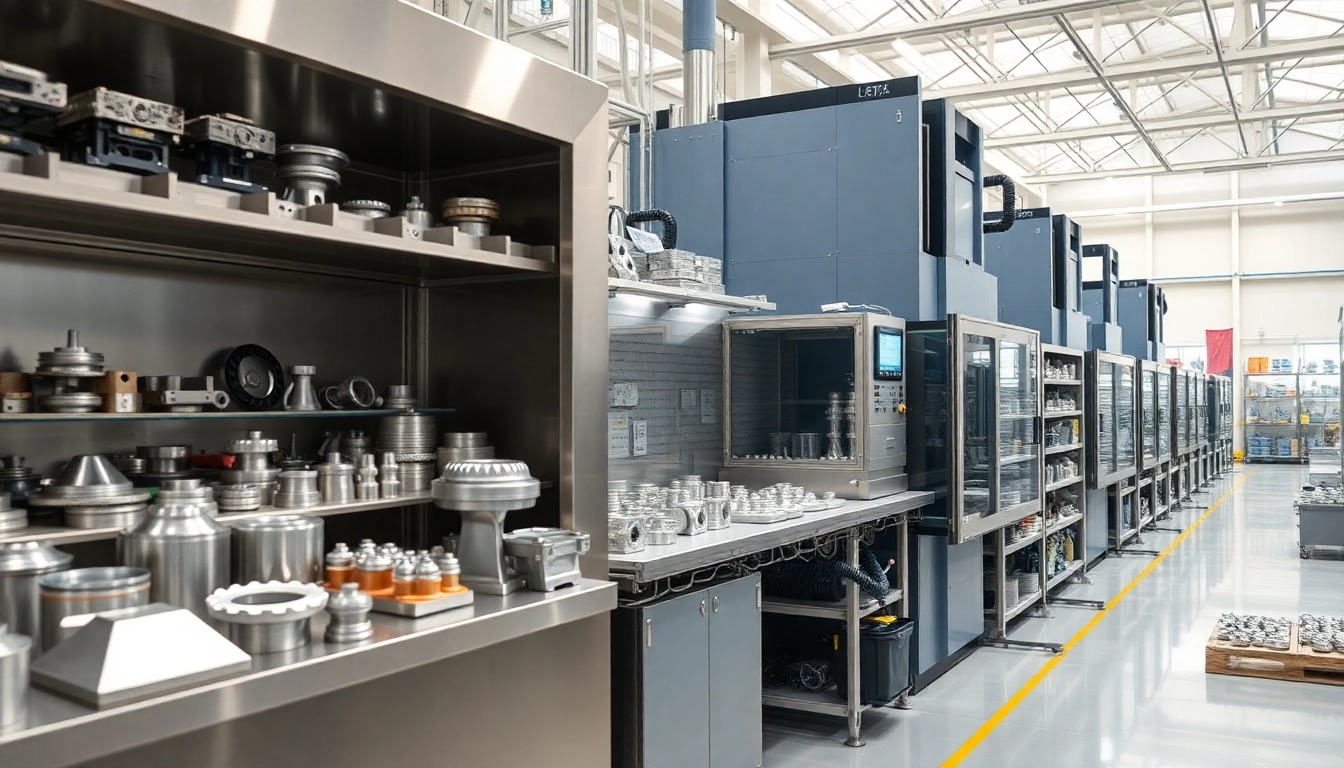Understanding Precision Die Casting in Malaysia
Precision die casting has emerged as a vital manufacturing process in Malaysia, particularly as industries seek to enhance productivity and quality in their production lines. This process allows for the mass production of complex metal components with high accuracy, making it a preferred choice for various sectors including automotive, electronics, and aerospace. With the growing demand for quality and efficiency, Malaysian die casting firms are at the forefront of innovation, providing cutting-edge solutions. When exploring options, precision die casting Malaysia offers comprehensive insights into the capabilities and advancements that these manufacturers have achieved.
What is Precision Die Casting?
Precision die casting is a process in which molten metal is injected into a mold to create specific components. The molds are typically made from steel and are designed to allow for intricate details and smooth surface finishes. The process is particularly suited for metals such as aluminum, zinc, and magnesium, owing to their favorable properties like low density, high strength, and excellent corrosion resistance. The precision aspect of this technique refers to the ability to produce parts that meet tight tolerances and specifications, making them suitable for high-performance applications.
Key Advantages of Precision Die Casting Malaysia
- High Precision and Accuracy: The use of advanced molds and precise control over the casting process ensures that parts are manufactured to exact specifications.
- Cost-Effectiveness: Mass production capabilities lead to lower costs per unit, making it an economical choice for large-scale manufacturing.
- Enhanced Durability: Die-cast components are known for their strength and resistance to wear, which makes them ideal for demanding applications.
- Design Flexibility: Manufacturers can create complex geometries that are difficult to achieve with other manufacturing methods.
Applications Across Industries
The versatility of precision die casting makes it suitable for a wide array of applications. In the automotive sector, die-cast components are utilized in engine blocks, transmission cases, and wheel rims. The electronics industry also benefits from this process through the production of housings, heat sinks, and connectors. Aerospace manufacturers use precision die casting for parts in aircraft engines and structural components, emphasizing the need for lightweight yet strong materials.
Choosing the Right Die Casting Manufacturer
As the demand for precision die casting grows, choosing the right manufacturer becomes crucial. Companies must evaluate potential partners based on their capabilities, reputation, and compliance with industry standards. It is essential to consider not only the technical expertise but also the customer service and commitment to quality that a manufacturer can provide.
Criteria for Selecting a Manufacturer
When selecting a die casting manufacturer, businesses should consider several criteria:
- Experience: Look for manufacturers with a proven track record in the industry.
- Technology: Evaluate the technology and equipment employed to ensure they meet modern manufacturing standards.
- Quality Assurance: Consider manufacturers that have robust quality control measures in place.
- Customization Capabilities: Ensure the manufacturer can accommodate unique designs and specifications.
Evaluating Capabilities and Technologies
Manufacturers should invest in the latest die casting technologies to improve efficiency and precision. This includes the use of automated processes, advanced molding techniques, and real-time monitoring systems that enhance production quality and reduce waste. Understanding these technologies can help businesses choose a manufacturer that is aligned with their goals for productivity and innovation.
Understanding Certifications and Standards
Quality certifications such as ISO 9001 indicate that a manufacturer adheres to international quality management standards. It is crucial to partner with companies that are both certified and compliant with relevant industry standards, as this reflects their commitment to quality and reliability. Furthermore, certifications specific to the automotive or aerospace industries can provide additional assurance regarding the manufacturer’s capabilities.
Innovations Driving the Die Casting Industry
The die casting industry is continually evolving, driven by technological advancements and market demands. Innovations in materials, techniques, and processes are pushing the boundaries of what is possible in precision die casting.
Latest Technologies in Die Casting
Recent advancements have introduced new materials and techniques that enhance the die casting process. For instance, the adoption of 3D printing in mold creation allows for rapid prototyping and complex designs that were previously unachievable. Additionally, the integration of robotics and automation in the casting process has significantly increased production speed and precision.
Impact of Automation and AI
Automation and artificial intelligence (AI) are transforming manufacturing processes, including die casting. AI algorithms can optimize production schedules, predict equipment failures, and enhance quality control by analyzing production data in real time. This results in increased efficiency and reduced operational costs.
Sustainability Trends in Precision Die Casting
As sustainability becomes a critical consideration for manufacturers, the die casting industry is focusing on reducing waste and energy consumption. Innovations include the use of recycled materials and the implementation of energy-efficient manufacturing practices. Sustainable die casting not only meets regulatory requirements but also appeals to environmentally conscious consumers.
Best Practices in Precision Die Casting
To achieve optimal results in precision die casting, manufacturers must adhere to best practices throughout the production process. These practices encompass design considerations, quality control measures, and cost-efficiency strategies.
Design Considerations for Optimal Results
Effective design is key to successful die casting. Components should be designed with manufacturing constraints in mind, including wall thickness, draft angles, and fillet radii. Utilizing simulation software can help designers visualize and predict how the component will behave during the casting process, leading to better-informed design choices.
Quality Control Measures
Implementing rigorous quality control measures is essential to ensure that die-cast components meet specifications. This includes in-process inspections, end-of-line testing, and adherence to quality standards. Employing advanced inspection technologies such as X-ray and ultrasonic testing can also detect defects that are invisible to the naked eye.
Cost-Efficiency Strategies
To maintain profitability, manufacturers must employ strategies to reduce costs without compromising on quality. This can be achieved through process optimization, material selection, and waste reduction initiatives. Collaborative relationships with suppliers can also enhance cost efficiency by securing better pricing and terms.
Future Trends in Malaysia’s Die Casting Sector
With the landscape of die casting continually changing, manufacturers in Malaysia must stay ahead of emerging trends to remain competitive. The following sections outline key predictions and opportunities that could shape the future of the industry.
Market Predictions for 2025
Market analysts predict that the demand for precision die casting will continue to rise, particularly in sectors like automotive and electronics. Innovations such as lightweight materials and smarter manufacturing processes are expected to drive growth further. By 2025, the Malaysian die casting market is anticipated to be worth significantly more as global demand increases.
Emerging Opportunities in New Markets
Emerging markets, particularly in Southeast Asia, present significant opportunities for Malaysian die casting manufacturers. As industries expand and new technologies are adopted, there is a growing need for high-quality components. By positioning themselves as leaders in precision die casting, Malaysian manufacturers can tap into these new markets.
Challenges Ahead for Manufacturers
Despite the promising outlook, the die casting industry faces challenges that manufacturers must address. These include rising material costs, competition from other manufacturing processes, and the need for continual innovation to meet customer demands. Embracing change and investing in technology will be crucial for overcoming these challenges.










